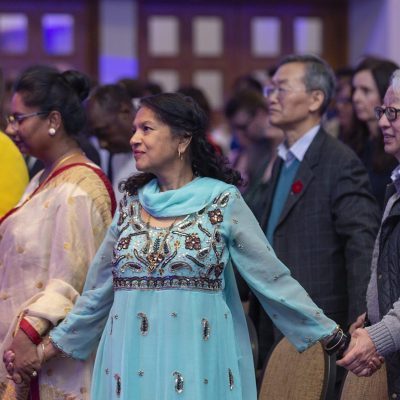We have a significant opportunity to share life with and encourage Christian witness to the non-Christian families that are already connected to our local churches.
Such was the finding of the Talking Toddlers research released in May. It showed that almost two-thirds of non-Christian parents with children under five have taken their children to a church-based activity such as a toddler group or Messy Church in the past year. “There’s a huge opening here,” says Rachael Heffer, the Evangelical Alliance’s head of mission. “Many non-Christian parents who seek supportive, friendly and values-driven environments for their children are coming to our churches, often on a weekly basis.”
I spoke with Rachael about the research, which was jointly commissioned by the Evangelical Alliance, HOPE Together and the Church of England, and about what churches might do to be an impactful Christian witness in these spaces.
The stats are encouraging! 62 per cent of non-Christian parents or carers of 0 – 4 year olds attend groups within our churches. Why are they popular?
Being a parent is challenging. You enter an unknown world, especially when becoming a parent for the first time. It has the potential to be overwhelming and isolating. The needs of a baby or young child are significant and can take over your world as you knew it.
These groups can therefore be a lifeline for many. Parents re-evaluate and look for such lifelines to help them grapple with their new lifestyle. Opportunities to connect with other adults, manage the challenges of parenting alongside others, and discover new spaces to enjoy parenting are invaluable. These needs are so often met within the warm welcome of church toddler groups, and non-Christian parents see the benefit.
The research also shows that parents believe these activities will enhance their children’s lives. Forty per cent participate in these groups because their children will enjoy them; 33 per cent go so their children can make friends; 29 per cent want their children to learn good values. Isn’t it also interesting that 18 per cent would like their children to be familiar with church?
I’m heartened that 55 per cent of the 62 per cent had said they explored their own beliefs as a result of taking their young children along to a church activity.
I know of a lady who became a Christian in a toddler group setting, having taken her own children along. She went on to run that group for 20+ years. This flags the huge opportunity, and challenge, to ensure our groups have an accessible and Christian distinctiveness. As people are welcomed and drawn into community, there’s great potential for God’s Spirit to bring about an encounter with Christians and with Jesus.
Many of my friends with newborns who came along with me to local church toddler groups loved the sense of warmth and openness. They started to ask questions: why do they care about me and my children? Why do they remember my name? The question I asked myself was: beyond them developing a love for the community, how do we help point them to Jesus?
Dr Rachel Jordan-Wolf, assistant director of HOPE Together, emphasises that the church can use these activities not just to engage the parents but to share the gospel with under-fives.
The research focuses on engagement with the whole family, and the faith of children is at the heart of this ministry. Children as young as three have had encounters with Jesus that have impacted their adult lives. Rachel Jordan-Wolf remembers praying and singing her own worship songs at the age of three. I became a Christian at seven at a church holiday club, but I had a relationship with Jesus long before that, having learnt that Jesus is my friend. The research reminds us that this is a significant missional opportunity for all churches. Those already running groups may wish to review this aspect of church life and raise the Christian distinctiveness and content of the groups, acknowledging that it is both expected and welcomed.
There’s also a prompt for churches that don’t yet run such activities. Why not take the steps to establish a toddler group or similar, to welcome families into the life of the church? It’s a great opportunity to involve all members of the church to simply provide a space for families, carers, grandparents to come, feel at home, and engage in new and meaningful relationships.
Being strategic and intentional are clearly key components of successful church based activities for under-fives.
We’re to be consistent. Running such activities week in and week out is demanding, but we can’t underestimate the positive impact consistency and familiarity have on these parents, who we’ve described in the report as ‘fringe parents’. We’re also to be holistic (interested in the whole family), prayerful, openminded (appreciating that for some families these activities are perceived as ‘church’) and flexible with when we hold these events so that whole families can attend.
Strategising and careful planning is important, and we should think long term. Ministry to young children is crucial and can be incredibly formative, but what might the transitional piece look like for your church? We need to ask ourselves, what about when these children are seven, eight, nine years old? It’s most certainly worth looking at the hoped-for spiritual development in a child from 0 – 18 years old and letting this guide our planning and provision.
Can we do more to invite our non-Christian friends into church? 35 per cent of parents who have no connection with a church would welcome an invitation to a church-based activity for them and their children.
As a Christian adult with young children, I found that inviting friends with young children along to a toddler group or Messy Church was the easiest missional opportunity that I’ve ever had. Many of these activities are aligned with what feels and seems familiar to non-Christian parents and, as I mentioned earlier, meet the needs of their children.
Very rarely did any of my friends turn down an invitation. So, yes, I think we should be doing more, recognising that this is an open door for us. The research shows us that 73 per cent of ‘fringe parents’ attend a Messy Church or toddler group through word of mouth, i.e., an invitation from a friend.
Due to coronavirus, churches aren’t running these groups. Is there anything churches can do now to engage with these families?
This research is not to be banked for when we are gathered again in our bigger numbers. I’d love to encourage all churches to still be intentional in their outreach to these families who may need them even more than usual. Looking at the research, with a COVID lens over it, let’s ask ourselves as leaders, what could be done online and through small groups before things return to normal?
Many leaders of toddler groups have run Zoom gatherings with parents and their children. These have included bedtime stories and storytelling, engaging families even during lockdown. Some have seen encouraging growth in their numbers and many a positive response from both parents, carers and children alike.
What would you say are the top three takeaways from the report?
Review your focus in this area in light of the findings; we feel this ministry should be a priority for a church and, where investment and time is given to this ministry, stands to bear great fruit. Recognise that Christian community is a lifeline for parents of 0 – 4 year olds, particularly first-time parents, for whom the experience can initially be daunting and challenging. Lastly, don’t wait; connect with these families now – the pandemic doesn’t need to be a barrier.
"As a Christian adult with young children, I found that inviting friends with young children along to a toddler group or Messy Church was the easiest missional opportunity that I’ve ever had."
Talking Toddlers webinar and case study
Visit www.eauk.org/great-commission/resources/talking-toddlers for more on the research. Register for a Talking Toddlers webinar which will take place on 25 September at www.hopetogether.org.uk/talkingtoddlers
Find out how the church Rachael Heffer attends, Countess Free Church in Ely, connects with local families who aren’t believers through its baby and toddler group, Two by Two.



